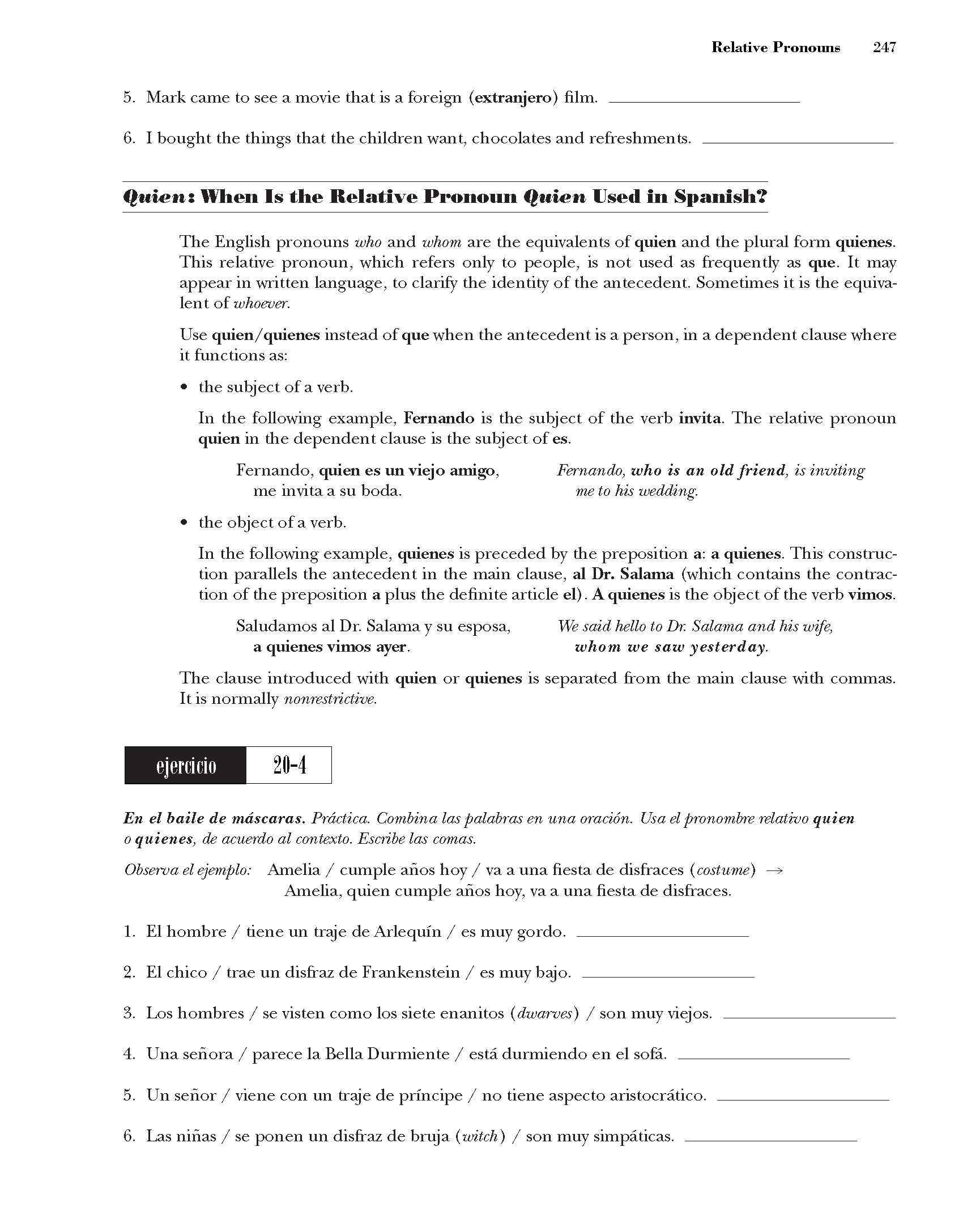CSG258

Relative Pronouns
247
5. Mark came to see a movie that is a foreign (extraiijero) film. _
6. I bought the things that the children want, chocolates and refreshments.
ĄuU>n s Wlieii Is the Relative Pronoun ĄuU>n Used in Spanish?
The English pronouns who and whom are the equivalents of quien and the plural form qmenes. This relative pronoun, which refers only to people, is not used as frequently as que. It may appear in written language, to clarify the identity of the antecedent. Sometimes it is the equiva-lent of whoeuer.
Use quien/quienes instead of que when the antecedent is a person, in a dependent clause where it functions as:
• the subject of a verb.
In the following example, Fernando is the subject of the verb invita. The relative pronoun quien in the dependent clause is the subject of es.
Fernando, quien es un viejo amigo, Fernando, who is an old friend, is inwiting
me invita a su boda. me to his wedding.
• the object of a verb.
In the following example, quienes is preceded by the preposition a: a quienes. This construc-tion parallels the antecedent in the main clause, al Dr. Salama (which contains the contrac-tion of the preposition a plus the definite article el). A quienes is the object of the verb vimos.
Saludamos al Dr. Salama y su esposa, We said hello to Dr Salama and his wije, a quienes vimos ayer. whom we saw yesterday.
The clause introduced with quien or quienes is separated ffom the main clause with commas. It is normally nonrestrictive.
20-4
ejercicio
En el haile de mascaras. Practica. Combina las palabras en una oración. Usa el pronombre relatwo ąuien o ąuienes, de acuerdo al contexto. Escńbe las comas.
Obserua el ejemplo: Amelia / cumple ańos hoy / va a una fiesta de disfraces (costume) —>
Amelia, quien cumple ańos hoy, va a una fiesta de disfraces.
1. El hombre / tiene un traje de Arlequfn / es muy gordo. _
2. El chico / trae un disffaz de Frankenstein / es muy bajo. _
3. Los hombres / se visten como los siete enanitos (dwarues) / son muy viejos. _
4. Una seńora / parece la Bella Durmiente / esta durmiendo en el sofa. _
5. Un seńor / viene eon un traje de prmcipe / no tiene aspecto aristocratico. _
6. Las nińas / se ponen un disffaz de bruja (witch) / son muy simpaticas. _
Wyszukiwarka
Podobne podstrony:
STRATEG IC PLANS TO ADDRESS CHALLENGESRcduce CostReview of the ICL contract by both ICL and theTCIG
Strategie Plans to Address Challenges Review ofthe ICLcontract by both ICL and theTCIG to see if the
CSG055 44 Complete Spanish Grammar 6. So many commercials! She paid to see a movie
attachment�7 (5) USDJPY 6Omiń. 119.00 greenbar check. gree: chęciIfO 118.891BdT still waiting to see
The MySQL Database Server is very fast, reliable, scalable, and easy to use. If that is what you are
Using Client Programs in a MultipleServer Environment To connect with a Client program to a MySQL se
połacz do pary 1 Shapes Draw a linę to the shape that is the same. Copyright © BillyBear4Kids.com
gramatyka0003 Relative clauses - revision 1 Put in the missing relative pronoun, or — if it is poss
CSG256 Relative Pronouns 245 Relative pronouns may refer to people, things, actions, events, or idea
img front BETTY CAME TO A STANDSTIl.l., AND PKINCI. 1 IKEWISF, THE [ATTER Pl.TTtNG orr HIS TONGl.T.,
imgdots01 ZOI’,00 HDE Ą FFJEND. MW (XfcI.D rr BF. Connect Ihe numbers 1 to to see who ca me to vis*t
imgdots03 Connecfc tho Jefcfcers A to Z to see who ca me to visit Zoboo afc Amroal Junction! Decorat
więcej podobnych podstron